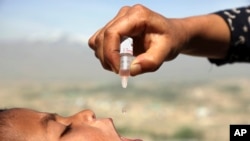Widespread unrest in Afghanistan has kept thousands of children from receiving polio vaccines, Afghan officials claim.
"During each polio vaccination drive, we target about 6 million children," Mir Jan Rasekh, head of the Afghanistan Polio Eradication Public Awareness Program, told VOA. "But due to unrest, fighting, and opposition of armed groups to the vaccine, an estimated 300,000 children (will be) missing the polio vaccines."
Rasekh added, "IS fighters do not permit children to receive the anti-polio vaccine in areas under their control."
Afghan officials charge that contentious fighting, unrest and the Taliban, Islamic State and other armed groups are the main obstacles in hard-to-reach areas in southern, southeastern and eastern Afghanistan.
According to the Afghan ministry of public health, three positive cases of the polio virus were recorded in January only— two in southern Kandahar, and one in eastern Nangarhar.
Last year, multiple cases were recorded across the country — seven in southern Kandahar, two in southern Helmand, three in eastern Nangarhar, one in southern Zabul and one in the northern Kunduz province.
Afghanistan and Pakistan share a border of more than 2,000 kilometers. Thousands of people who cross the border can easily transmit the virus in both countries.
Health officials in the eastern Nangarhar province claim that up to 8,000 children have not received the vaccine.
"The number of these children in five restive districts of Nangarhar province was 17,000. But now it has reached 8,000. We are working to bring this number down." Najibullah Kamawal, chief of public health in eastern Nangarhar, told VOA.
Officials in the northern restive districts of Afghanistan also said that an estimated 30,000 children missed the recent anti-polio campaign.
"We call on armed oppositions not to stop anti-polio drives in areas under their control," Lutfullah Azizi, Jawzjan province governor, told the media last month.
Afghan health officials said religious clerics, local elders and other leaders have been influential in convincing the armed groups opposing the vaccination — particularly the Taliban — to let the children receive the vaccine. They admit, however, that anti-polio campaigners are facing occasional problems.
"These problems are not permanent. Sometimes, some of the local commanders of armed oppositions create problems for the campaigners, but we solve those problems through influential people, local imams (prayer leaders of local mosques) and elders," Hedayatullah Stanikzai, an adviser to the Afghan health minister, told VOA.
The new cases of polio have caused concern among the international stakeholders who are part of the campaign to eradicate polio from Afghanistan.
The United Nations Children's Fund (UNICEF) in Afghanistan worried that the number of cases recorded in January means more children are at risk.
"The existence of the virus and the children's weak immunity paves the way for the virus to spread more than ever before. We cannot stress enough that polio vaccines must reach every child," said Sayed Kamal Shah, spokesperson for the UNICEF polio program.
Poliomyelitis, or polio, is a highly infectious viral disease that mainly affects children under five years of age. The virus is transmitted from person to person and can invade the nervous system and cause paralysis or death.
Afghanistan, Pakistan and Nigeria are the three countries in the world where the polio virus remains endemic.





